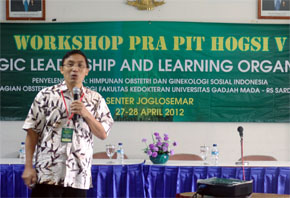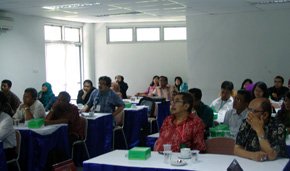THE 6 POSTGRADUATE FORUM ON HEALTH SYSTEMS & POLICIES
Inspiring Sustainable Management of NCD :
Challenges and Solutions for Health Systems
21 – 22 MAY 2012
WORLD YOUTH HOTEL, MELAKA, MALAYSIA
Laporan Hari I Laporan Hari II
Laporan Hari II
OVERVIEW
Non Communicable Diseases (NCD) are the leading causes of mortality and morbidity globally. In 2008, 63% of total deaths in the world (36.1 million deaths) were attributed to NCD, such as cardiovascular diseases, stroke, chronic respiratory diseases, cancers and diabetes. Approximately 80% of these NCD deaths (29 million) occurred in low- and middle-income countries and 29% of them were under the age of 60, compare to 13% in high income countries. As a result of population growth and improvement in longevity, it is estimated that NCD death will increase to 52 million in 2030. According to WHO projection, NCD will be responsible for three times as many disability adjusted life years (DALYs) and almost 5 times as many deaths as the combination of communicable diseases, maternal, perinatal and other nutritional conditions by 2030 in low and middle income countries,.
The urgency of addressing this issue has been the focus of attention of world leaders at the United Nations General Assembly, the World Health Assembly as well as the WHO Regional Committees. A great deal of research and study has been directed towards understanding NCD and its impact on the healthcare system as well as policy development and associated agenda. It has been well recognized that most NCDs are strongly associated and causally linked with various risk behaviours, mainly, tobacco use, physical inactivity, unhealthy diet and alcohol abuse. There is a critical need for strengthening national and global monitoring and surveillance system to increase the implementation of evidence-based measures to reduce the risk factors and to improve the access to cost effective health care interventions to reduce the mortality and morbidity among people.
The Postgraduate Forum is jointly organised by the United Nations University International Institute for Global Health (UNU-IIGH), Naresuan University, Gadjah Mada University and UKM Medical Centre, National University of Malaysia. It focuses on bringing together postgraduate students in the area of public health, health systems and policy, health economics, health financing and other fields of research related to healthcare and its management to share their research findings and communicate with their peers about their experiences.
FORUM OBJECTIVES
This forum is held as a platform for postgraduate students to communicate their knowledge and experiences gained during postgraduate work and share it with those who are newly enrolled in the programme. Recent updates on research methods and new research findings will be made available through keynote address and plenary sessions by the invited speakers.
Focus:
- Non-Communicable Diseases
- Economic Evaluations and Health Financing
- Health Sector Reform
- Information Technology in Healthcare
- Current State of Health Policies and Management in South East Asia
- Health Management
WHO SHOULD ATTEND
Postgraduate students from any and every field related to healthcare policy and management should take this opportunity to share their research and get feedback from their peers.
If you are considering postgraduate studies, either in the field of healthcare, associated disciplines or even other areas, you may want to take this opportunity to learn from the experiences of other graduate students.
Healthcare professionals and members of the public who have an interest in the public implications of NCDs are also welcome.
TENTATIVE PROGRAMME
SPEAKERS
Professor Abdallah Daar
Professor of Public Health Sciences & Professor of Surgery, University of Toronto and, Director Program on Ethics and Commercialization, McLaughlin-Rotman Centre for Global Health.
Professor Syed Mohamed Aljunid
Professor Dato' Dr Syed Mohamed Aljunid is a health economics professor and Senior Research Fellow at the United Nations University International Institute for Global Health.
Assistant Professor Ali Akbari Sari
Assistant Professor Ali Akbari Sari is a physician with a keen interest in public health, claims and risk management as well as improving scientific publications in clinical sciences. He is with the Tehran University of Medical Sciences at the Department of Health Management and Economics.
Professor Laksono Trisnantoro
Professor Laksono is a professor in the Universitas Gadjah Mada Department of Public Health. He has over a decade's experience researching health systems strengthening, financing and reform.
Professor Supasit Pannarunothai
Professor Pannarunothai is the Director of the Naresuan University Hospital and Dean of the Faculty of Medicine, Naresuan University. His primary interest is in improving health equity and accessibility to quality care through healthcare financing reform.
ABSTRACT SUBMISSION
Papers are invited in the areas of health policy and management as well as others within the scope of the forum. We strongly encourage the submission of abstracts via electronic means as soon as possible.
Abstracts should be no more than 300 words and state clearly the Title, Background, Methods, Results and Conclusions (abstract sample here). Please indicate the corresponding author by underlining the name. If the presenting author is different from the corresponding author, please indicate the name in bold.
The poster presentation dimension should be 1 by 1 metre in size in portrait format.
- Your display should include the TITLE and AUTHOR(s).
- The presentation must cover the same material as the abstract.
- You have complete freedom in displaying your information in figures, tables, text, photography, etc. Figures should be designed to be viewed from a distance and should use clear visible graphics and large type. Color can be effective if used sparingly; use saturated dark colors on white background and rich, bright colors on dark backgrounds.
- Briefly describe procedures and materials. Define all trade names first then, use generic names throughout. All compounds and drugs must be identified.
The abstract for oral / poster presentations should be submitted either in the electronic registration form or via e-mail to This email address is being protected from spambots. You need JavaScript enabled to view it..
The deadline for abstract submission is 31st March 2012.
FORUM REGISTRATION
Forum Registration Fee
Forum registration fee is a flat rate of MYR 250 for all participants.
Registration may be done electronically or manually. The registration form can be downloaded here. Please fill it up, scan and e-mail it to us This email address is being protected from spambots. You need JavaScript enabled to view it. or fax it to +603 - 9171 5402 together with your abstract and proof or payment. In lieu of proof of payment, we also accept guarantee letters from your institution. Please download a sample of a guarantee letter here.
Once the secretariat receives registration interest, an invoice for the forum fee will be issued and emailed to the participants. Registered participants will be required to make remittance of payment via Electronic Fund Transfer (EFT) ONLY with bank account details as indicated on the invoice. All payments and registration are to be made BEFORE 15th April 2012
CANCELLATION AND REFUND POLICY
Notification of cancellation must be made in writing to This email address is being protected from spambots. You need JavaScript enabled to view it.. The following provisions will take effect:
- 50% of seminar fee paid will be refunded if the notification reaches the Secretariat before 15th April 2012.
- No refund will be given for any cancellations after 1st May 2012.
INSTRUCTION FOR ABSTRACT
Abstract is in structured abstract format and must contain the following elements:
- Title
- Author(s)
- Background (last sentence incorporating the objective of the study)
- Methods
- Results
- Conclusion
Full names only, no initials. List first name, followed by surname and author institution in bracket. Separate authors with a semi-colon (;). E.g. Maryam, Abdul Samad (Universiti Malaysia Sabah); Kee-Peng, Chua (Universiti Teknologi Mara).
Corresponding author to be indicated with an asterisk (*). Please include corresponding author's telephone number, mailing address and e-mail address. The e-mail address of all authors must also be provided.
Abstract (without the headers above) should NOT EXCEED 300 WORDS.
Please e-mail abstract together with this form to This email address is being protected from spambots. You need JavaScript enabled to view it..
PAYMENT METHOD
Once you submitted the registration, an invoice for the registration fee will be e-mailed to you within 2 working days. Kindly make the necessary arrangements for payment and revert to us with proof of payment. Registration is only confirmed after proof of payment is provided.
For Local Order / Purchase Order, please fax / e-mail a scan copy of the document to us. A Guarantee Letter from your Institution is also acceptable.
For electronic payment, please e-mail "Print Screen Capture" image or any other proof of transaction.
ACCOMMODATION / VENUE
The Forum will be held at the World Youth Hotel. Accommodation rate is set at RM 120 for twin-sharing (i.e. 2 persons/room). Please contact the hotel below to book your accommodation in a timely manner; the secretariat
World Youth Hotel
Lebuh Ayer Keroh. 75450 Ayer Keroh, Melaka, Malaysia
Tel: +606-2333880/881 Fax: +606-2333882
Email: This email address is being protected from spambots. You need JavaScript enabled to view it.
Website: www.worldyouthhotel.com
CONTACT PERSON
Registration & Payment:
E-mail: This email address is being protected from spambots. You need JavaScript enabled to view it.
Telephone: +603 - 9171 5394 (ext. 106)
Fax.: + 603 - 9171 5402
Sary
Phone number: +62 274 547659, 542900
Email: This email address is being protected from spambots. You need JavaScript enabled to view it.
Graduate Program in Health Policy and Management Gadjah Mada University





